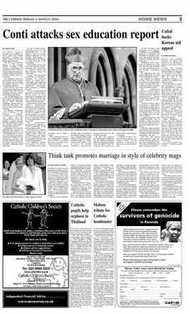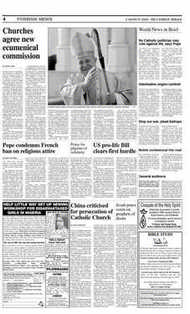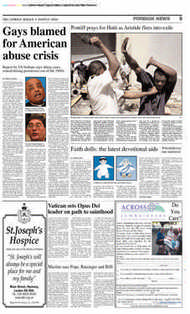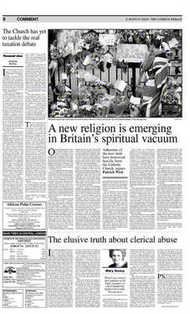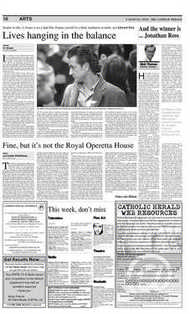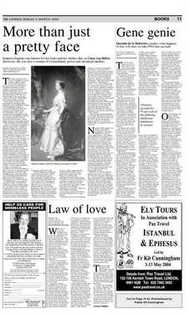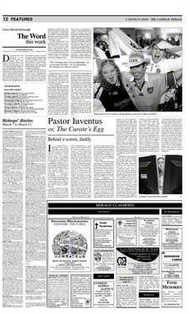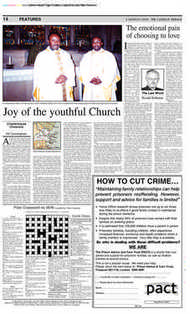Page 5, 5th March 2004
Page 5

Report an error
Noticed an error on this page?If you've noticed an error in this article please click here to report it.
Tags
Share
Related articles
Activists: Seminary Screening ‘intrusive’
Pope Ponders Cdf Document Prompted By American Crisis
`weakness Of Faith' Is At The Root Of American Abuse...
Sexual Abuse Of Young An 'appalling Sin', Says Pope
Pope Calls Crisis Talks With Us Cardinals Over Abuse...
Gays blamed for American abuse crisis
Report by US bishops says abuse cases soared during permissive era of the 1960s
BY SIMON CALDWELL
A REPORT has blamed sexuallyactive gay priests for the sexual abuse crisis in the American Catholic Church.
The report by the National Review Board of the US Conference of Catholic Bishops condemns the “gravely sinful” acts of some priests and criticises some American bishops for allowing the “smoke of Satan to enter the Church”.
It reveals a picture of “those who broke faith with their people, their priesthood and their religious vows to use their sacred position to prey on the young and vulnerable,” according to Bishop Wilton Gregory of Bellville, president of the bishops’conference.
Though the review board said it was not blaming the crisis on the presence of homosexuals in the priesthood, it called attention “to the homosexual behaviour that characterised the vast majority of the cases of abuse observed in recent decades”.
The 145-page report reveals that 81 per cent of abuse victims were male and that 78 per cent were aged between 11 and 17 years. It shows that the crisis had an “epidemic character” with the number of abuse cases soaring during the Sexual Revolution of the 1960s and continuing to remain high during the 1970s and 1980s before declining.
It also said large numbers of gay priests or seminarians “had the effect of discouraging heterosexual men from seeking to enter the priesthood”.
The board concluded that the failure to take disciplinary action against gay subcultures among priests and seminarians “contributed to an atmosphere in which sexual abuse of adolescent boys by priests was more likely”.
But at the press conference, Bishop Gregory indicated that there would be no gay witchhunt in the nation’s seminaries though, he said, screening would be more rigorous. “Our screening should look at all unhealthy psychological behaviour,” he said. “We will not fulfil our responsibility simply by focusing on one area.” He said he didn’t want seminarians who were selfish, or narcissistic, for example. “We should look for those who demonstrate sound moral, psychological, spiritual health and not focus on any one potential difficulty,” he said.
Bishop Gregory said he would not denigrate the service of any priest who was homosexually oriented but chaste.
The first of two reports, a statistical study by the John Jay College of Criminal Justice called “The Nature and Scope of Sexual Abuse of Minors by Catholic Priests and Deacons in the United States 1950-2002” was followed shortly afterwards by “A Report on the Crisis in the Catholic Church in the United States”, published by the review board, a panel of lay people commissioned to evaluate the causes and context of clerical sexual abuse.
The John Jay study reported that 4,392 priests and deacons were accused of sexual abuse involving 10,667 people in the 50-year period studied, representing four per cent of the estimated 110,000 priests who served in the country during that period.
The study also compiled data about the ages of those abused, the years in which it occurred and when it was reported, and the amount of money spent by dioceses in settling legal claims and providing treatment and other services to victims.
The review board’s report discussed various causes behind the abuse scandal, the attitudes and atmosphere at seminaries and how the church responded to abuse accusations.
American Catholic commentator George Weigel, the Pope’s biographer, said he thought the bishops’ report was a “real service to the Church” as Catholics faced the question of genuinely Catholic reform in light of the John Jay study of clerical sexual abuse.
“The report makes clear that Catholic doctrine isn’t and hasn’t been the problem, but rather the failure to teach and live the truths of faith,” said Mr Weigel, author of Courage to be Catholic, an analysis of the sex abuse crisis of 2002.
He said: “The report also squarely faces the two dimensions of the crisis — that is, sexual misconduct and episcopal misgovernance — and proposes that both of these aspects of the crisis are reflections of a deeper crisis of fidelity and spirituality.
“It acknowledges the overwhelmingly homosexual nature of the clerical sexual abuse of minors over the past 50 years, without using clinical terms that can serve as evasions — like ‘ephebophilia’— and in a sober way that cannot be reasonably interpreted as ‘scapegoating’or ‘gay-bashing’.” Mr Weigel added: “The report frankly describes the massive failures of seminaries in the late 1960s and throughout the ‘70s, stressing failures of spiritual and ascetic formation, and thus sets the framework for accelerating the reform of seminaries that’s been underway for some time.” POPE JOHN PAUL II said he was worried about worsening civil strife in Haiti, and he urged Haitians and the international community to resolve the situation there peacefully.
The Pope made the remarks on the day Haitian President JeanBertrand Aristide resigned and left the country. for exile in the Central African Republic. Aristide, a former Salesian priest, was the first democratically elected president of Haiti but had come under increasing criticism amid allegations of repression and corruption.
The Pope, speaking at a noon blessing before several thousand pilgrims, said he was following the “worri some and painful news” from Haiti.
“In the face of this situation, I feel the duty to invite all Haitians to have the courage and humility to make the decisions necessary for the good of the country,” he said.
“While I encourage the diplomatic efforts of the international community and ask for a generous commitment on the part of humanitarian organisations, I send a special blessing to the Haitian people.” Aristide, who appeared unable to stop an armed rebellion, resigned under US pressure. Within hours of his departure, small contingents of French and US troops were headed toward the impoverished Caribbean nation to serve as peacekeepers.
The Vatican had no official comment on Aristide’s resignation, but informed Vatican sources said it appeared there had been no other way out of the crisis.
The sources said it was important that order was quickly restored.
blog comments powered by Disqus




